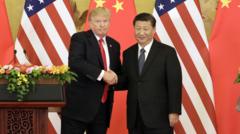The upcoming trade talks in Switzerland between the US and China signify a potential thaw in relations as both nations grapple with the domestic and international consequences of their trade war. While officials express a pragmatic desire to negotiate, the underlying tensions and political posturing suggest that significant agreements may still be a distant goal.
US-China Trade Talks: A Pivotal Moment or Just a PR Stunt?

US-China Trade Talks: A Pivotal Moment or Just a PR Stunt?
As economic pressures mount, the US and China are set to engage in trade discussions in Switzerland, raising questions about the future of their tense relationship.
In a significant development, high-ranking trade officials from the United States and China are set to convene in Switzerland for discussions, marking the first high-profile talks since the onset of an intensifying economic conflict between the two countries. This meeting comes after a series of escalating tariffs, with the US imposing duties of 145% on Chinese imports and corresponding retaliatory measures from China.
With weeks of antagonistic rhetoric framing each side as more desperate than the other, the timing of these discussions prompts scrutiny. Analysts, such as Stephen Olson from Singapore's ISEAS-Yusof Ishak Institute, indicate that the talks reflect a mutual understanding that both nations aim to avoid the image of conceding defeat. "Neither side wants to appear to be backing down," Olson noted, suggesting that the negotiations may be a strategic maneuver to alleviate mounting pressures without a significant loss of face.
Chinese officials have positioned the discussions as a gesture responding to US calls, while the Trump administration has portrayed the negotiations as an expression of China's economic distress. In present circumstances, the precarious state of both economies—exemplified by reported declines in manufacturing and concern within US industries reliant on Chinese supplies—heightens incentives for a diplomatic breakthrough.
Furthermore, the geopolitical backdrop of President Xi Jinping's concurrent visit to Moscow during the negotiations underscores China's effort to assert its global presence and diminish perceptions of dependency on the US. This parallel engagement with alternative world leaders reinforces Beijing's stance, even as the negotiating table is set.
As both nations prepare to address a number of contentious issues, including China's economic policies, the immediate objectives remain modest: establishing a framework for ongoing dialogue rather than sealing any substantial agreements. Experts predict the talks may resemble a preliminary round before more detailed discussions unfold over the coming months.
While the Geneva meetings provide a stage for renewed diplomatic engagement, the complexity of systemic issues complicates any expectation of swift resolutions. Historical precedents suggest that previous negotiations have yielded limited immediate outcomes, and current conversations may ultimately reflect the same trend. The path ahead remains fraught with challenges, but the discussions may signal a cautious step toward navigating the tangled web of trade relations.
With weeks of antagonistic rhetoric framing each side as more desperate than the other, the timing of these discussions prompts scrutiny. Analysts, such as Stephen Olson from Singapore's ISEAS-Yusof Ishak Institute, indicate that the talks reflect a mutual understanding that both nations aim to avoid the image of conceding defeat. "Neither side wants to appear to be backing down," Olson noted, suggesting that the negotiations may be a strategic maneuver to alleviate mounting pressures without a significant loss of face.
Chinese officials have positioned the discussions as a gesture responding to US calls, while the Trump administration has portrayed the negotiations as an expression of China's economic distress. In present circumstances, the precarious state of both economies—exemplified by reported declines in manufacturing and concern within US industries reliant on Chinese supplies—heightens incentives for a diplomatic breakthrough.
Furthermore, the geopolitical backdrop of President Xi Jinping's concurrent visit to Moscow during the negotiations underscores China's effort to assert its global presence and diminish perceptions of dependency on the US. This parallel engagement with alternative world leaders reinforces Beijing's stance, even as the negotiating table is set.
As both nations prepare to address a number of contentious issues, including China's economic policies, the immediate objectives remain modest: establishing a framework for ongoing dialogue rather than sealing any substantial agreements. Experts predict the talks may resemble a preliminary round before more detailed discussions unfold over the coming months.
While the Geneva meetings provide a stage for renewed diplomatic engagement, the complexity of systemic issues complicates any expectation of swift resolutions. Historical precedents suggest that previous negotiations have yielded limited immediate outcomes, and current conversations may ultimately reflect the same trend. The path ahead remains fraught with challenges, but the discussions may signal a cautious step toward navigating the tangled web of trade relations.






















